I love to read. I find it helpful to summarize my thoughts on each book and I offer those thoughts in the hope that you will be encouraged to either read or pass over the given title.
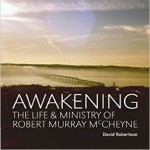 Awakening: The Life & Ministry of Robert Murray McCheyne by David Robertson. Robertson’s chronicle of M’Cheyne comes with the author’s unique vantage point: he is the current minister of St. Peter’s in Dundee, M’Cheyne’s church of old. The consistent interest and “unrealistic expectations of many who came to inquire about M’Cheyne” set Robertson on a course of discovery. He cynically thought, “Was [M’Cheyne] not just famous because he died young and had a book book written about him?” Robertson’s research lead him to conclude . . . wait for it . . . M’Cheyne has amazing relevance for today! The saintly Scotsman continues to awaken ministers today. Like almost every biography of M’Cheyne, Awakening is arranged topically instead of chronologically. Will we ever have a modern, chronological biography of RMM? One day, I hope. I personally found Robertson’s lack of citations maddening from a scholarly perspective, but his work on setting M’Cheyne in his historical context is magnificent.
Awakening: The Life & Ministry of Robert Murray McCheyne by David Robertson. Robertson’s chronicle of M’Cheyne comes with the author’s unique vantage point: he is the current minister of St. Peter’s in Dundee, M’Cheyne’s church of old. The consistent interest and “unrealistic expectations of many who came to inquire about M’Cheyne” set Robertson on a course of discovery. He cynically thought, “Was [M’Cheyne] not just famous because he died young and had a book book written about him?” Robertson’s research lead him to conclude . . . wait for it . . . M’Cheyne has amazing relevance for today! The saintly Scotsman continues to awaken ministers today. Like almost every biography of M’Cheyne, Awakening is arranged topically instead of chronologically. Will we ever have a modern, chronological biography of RMM? One day, I hope. I personally found Robertson’s lack of citations maddening from a scholarly perspective, but his work on setting M’Cheyne in his historical context is magnificent.
 Joseph and the Gospel of Many Colors: Reading an Old Story in a New Way by Voddie Baucham. Several years ago Baucham woke up from homiletical moralism when a Conservative Jew sent him a letter after listening to one of his Old Testament sermons. She said she’d “never imagined being able to get so much out of a message preached by a Gentile!” This started Baucham on journey of evaluating the degree to which his preaching was Christ-centered. Joseph and the Gospel of Many Colors represents his model of Christocentric, not moralistic, preaching on the Old Testament. I figured I’d give the book a whirl as I plan to preach Genesis 37-50 tomorrow night at IDC. He does an excellent job focusing on Genesis’ land, seed, and covenant themes, but I felt he missed some big redemptive-historical points on God’s election of Judah and providential protection of His people by placing them in Egypt. Ironically, almost every chapter’s exposition ends with a section of “Takeaways,” which—from my perspective—are actually very . . . well, moral. So, maybe there is a place for moral application after all.
Joseph and the Gospel of Many Colors: Reading an Old Story in a New Way by Voddie Baucham. Several years ago Baucham woke up from homiletical moralism when a Conservative Jew sent him a letter after listening to one of his Old Testament sermons. She said she’d “never imagined being able to get so much out of a message preached by a Gentile!” This started Baucham on journey of evaluating the degree to which his preaching was Christ-centered. Joseph and the Gospel of Many Colors represents his model of Christocentric, not moralistic, preaching on the Old Testament. I figured I’d give the book a whirl as I plan to preach Genesis 37-50 tomorrow night at IDC. He does an excellent job focusing on Genesis’ land, seed, and covenant themes, but I felt he missed some big redemptive-historical points on God’s election of Judah and providential protection of His people by placing them in Egypt. Ironically, almost every chapter’s exposition ends with a section of “Takeaways,” which—from my perspective—are actually very . . . well, moral. So, maybe there is a place for moral application after all.
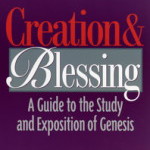 Creation & Blessing: A Guide to the Study and Exposition of Genesis by Allen Ross. Throughout the summer we’ve been preaching through the book of Genesis with some noticeable velocity (doing all fifty chapters in fourteen weeks). As such, I simply didn’t have time to read many commentaries cover to cover. Walton’s commentary alone takes almost two hundred pages to just get through Genesis 3! Ross’s work is long (coming in at over 700 pages), but gloriously useful. Not every expositor will agree with what Ross contends to be the main point of a given pericope, but I found him especially helpful on historical context and contemporary application. Any pastor preaching through Genesis should have this resource on hand.
Creation & Blessing: A Guide to the Study and Exposition of Genesis by Allen Ross. Throughout the summer we’ve been preaching through the book of Genesis with some noticeable velocity (doing all fifty chapters in fourteen weeks). As such, I simply didn’t have time to read many commentaries cover to cover. Walton’s commentary alone takes almost two hundred pages to just get through Genesis 3! Ross’s work is long (coming in at over 700 pages), but gloriously useful. Not every expositor will agree with what Ross contends to be the main point of a given pericope, but I found him especially helpful on historical context and contemporary application. Any pastor preaching through Genesis should have this resource on hand.
 Genesis by Derek Kidner. The only other Genesis commentary of which I read every page is this one by the venerable Derek Kidner. I found it characteristically lucid, occasionally brilliant, and consistently insightful. The book’s brevity (just over 200 pages) means it won’t be as exhaustive as some preachers might want, but it is nonetheless a model of essentiality in biblical studies. Thus, Kidner doesn’t veer into every possible debate, but instead chooses to focus the reader’s concentration on the concentration(s) of Genesis itself. Well done.
Genesis by Derek Kidner. The only other Genesis commentary of which I read every page is this one by the venerable Derek Kidner. I found it characteristically lucid, occasionally brilliant, and consistently insightful. The book’s brevity (just over 200 pages) means it won’t be as exhaustive as some preachers might want, but it is nonetheless a model of essentiality in biblical studies. Thus, Kidner doesn’t veer into every possible debate, but instead chooses to focus the reader’s concentration on the concentration(s) of Genesis itself. Well done.
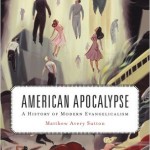 American Apocalypse: A History of Modern Evangelicalism by Matthew Avery Sutton. Sutton’s history of modern evangelicalism breaks from the common historical mold on four points: 1) he places substantial emphasis on World War I’s impact on radical evangelicalism, 2) he argues historians have exaggerated the significance of the Scopes trial, 3) he stresses greater continuity in the fundamentalist story than Marsden, and 4) he eschews sharp distinctions between the politics and tactics of pre-World War II fundamentalism and postwar evangelicalism. Knowledgeable readers understand that what Sutton attempts in American Apocalypse is nothing less than a reshaping of how we interpret the history of evangelicalism. The unifying force for his interpretation is late-19th century to late-20th century evangelicalism’s love affair with premillennialism. His impressive, sweeping research shows how apocalyptic sensibilities dominated evangelicalism’s political moves in the 20th century. Not everyone will agree with his conclusions, but this reading of modern evangelicalism is one to be reckoned with. Tolle lege!
American Apocalypse: A History of Modern Evangelicalism by Matthew Avery Sutton. Sutton’s history of modern evangelicalism breaks from the common historical mold on four points: 1) he places substantial emphasis on World War I’s impact on radical evangelicalism, 2) he argues historians have exaggerated the significance of the Scopes trial, 3) he stresses greater continuity in the fundamentalist story than Marsden, and 4) he eschews sharp distinctions between the politics and tactics of pre-World War II fundamentalism and postwar evangelicalism. Knowledgeable readers understand that what Sutton attempts in American Apocalypse is nothing less than a reshaping of how we interpret the history of evangelicalism. The unifying force for his interpretation is late-19th century to late-20th century evangelicalism’s love affair with premillennialism. His impressive, sweeping research shows how apocalyptic sensibilities dominated evangelicalism’s political moves in the 20th century. Not everyone will agree with his conclusions, but this reading of modern evangelicalism is one to be reckoned with. Tolle lege!
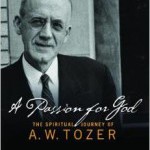 A Passion for God: The Spiritual Journey of A.W. Tozer by Lyle Dorsett. Before reading Dorsett’s work my knowledge of Tozer was limited to his two most famous works: The Knowledge of the Holy and The Pursuit of God. He had a huge impact on my grandparents and subsequently my parents, so I thought it’d be enjoyable to dive into this brief introduction. I can’t say I was disappointed; what an interesting life and ministry! Here we find many strange inconsistencies housed in one man (but isn’t that true of us all?). He came out of Pentecostal background and didn’t ever repudiate it, nevertheless he focused not on Christ as Healer, but Christ as Savior and Sanctifier. He was a powerful preacher and man of prayer, but fell way short as a shepherd, husband, and father. Dorsett ably moves the story along, but I found his pen regularly repetitive and somewhat odd (see his affinity for the word “purposive”).
A Passion for God: The Spiritual Journey of A.W. Tozer by Lyle Dorsett. Before reading Dorsett’s work my knowledge of Tozer was limited to his two most famous works: The Knowledge of the Holy and The Pursuit of God. He had a huge impact on my grandparents and subsequently my parents, so I thought it’d be enjoyable to dive into this brief introduction. I can’t say I was disappointed; what an interesting life and ministry! Here we find many strange inconsistencies housed in one man (but isn’t that true of us all?). He came out of Pentecostal background and didn’t ever repudiate it, nevertheless he focused not on Christ as Healer, but Christ as Savior and Sanctifier. He was a powerful preacher and man of prayer, but fell way short as a shepherd, husband, and father. Dorsett ably moves the story along, but I found his pen regularly repetitive and somewhat odd (see his affinity for the word “purposive”).
 Flight of Passage: A Memoir by Rinker Buck. In the summer of 1966 brothers Kern and Rinker Buck—aged seventeen and fifteen respectively—flew from New Jersey to California in an old Piper Cub. Their story captivated the media and had reporters chasing them from one country airport to the next. Rinker’s memoir of that special summer makes for perfect summer reading. The prose is breezy, the story is simultaneously poignant and hilarious, and the history is joyfully informative. I found myself longing for youthful days of old when summers with friends were times of unusual freedom to pursue our wildest dreams.
Flight of Passage: A Memoir by Rinker Buck. In the summer of 1966 brothers Kern and Rinker Buck—aged seventeen and fifteen respectively—flew from New Jersey to California in an old Piper Cub. Their story captivated the media and had reporters chasing them from one country airport to the next. Rinker’s memoir of that special summer makes for perfect summer reading. The prose is breezy, the story is simultaneously poignant and hilarious, and the history is joyfully informative. I found myself longing for youthful days of old when summers with friends were times of unusual freedom to pursue our wildest dreams.
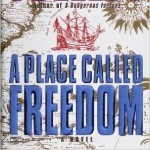 A Place Called Freedom by Ken Follett. Around twenty years ago, while gardening at High Glen House, Follett found a prisoner’s collar with the engraving, “This man is property of Sir George Jamisson of Fife, AD 1767.” The keepsake became a paper weight and eventually the catalyst for A Place Called Freedom. Here Follett creates some historical fiction about one who may have borne the collar, a Scottish protagonist he names Mack McAsh. With Follett’s usual intensity the story moves along rapidly, finding McAsh heading off to the New World to find freedom, all the while with his enemies in hot pursuit. The portrait of plantation life in early Virginia is particularly fascinating, even if a few of Follett’s sociological conventions are a bit too modern.
A Place Called Freedom by Ken Follett. Around twenty years ago, while gardening at High Glen House, Follett found a prisoner’s collar with the engraving, “This man is property of Sir George Jamisson of Fife, AD 1767.” The keepsake became a paper weight and eventually the catalyst for A Place Called Freedom. Here Follett creates some historical fiction about one who may have borne the collar, a Scottish protagonist he names Mack McAsh. With Follett’s usual intensity the story moves along rapidly, finding McAsh heading off to the New World to find freedom, all the while with his enemies in hot pursuit. The portrait of plantation life in early Virginia is particularly fascinating, even if a few of Follett’s sociological conventions are a bit too modern.
 Hornet Flight by Ken Follett. Before his smashing success with The Century Trilogy Follett’s bestsellers usually were works of World War II-era historical fiction. Hornet Flight is one of those works. Here Follett’s invents immense intrigue in the realm of Danish resistance to Nazi occupation. The Danes developed one of the most successful Nazi resistance movements of the war, helping almost all Denmark’s Jews escape Hitler’s grasp. Follett tells the story of a few ordinary Danish citizens trying to help the RAF successfully breakthrough the Luftwaffe’s hold over Denmark. I’ve come to the conclusion that Follett is so adept at historical fiction page turners because he’s quite superb at developing believable, yet tyrannous villains. And few places in history had so many ghastly, ordinary villains as Nazi Germany. This one is entertaining all around.
Hornet Flight by Ken Follett. Before his smashing success with The Century Trilogy Follett’s bestsellers usually were works of World War II-era historical fiction. Hornet Flight is one of those works. Here Follett’s invents immense intrigue in the realm of Danish resistance to Nazi occupation. The Danes developed one of the most successful Nazi resistance movements of the war, helping almost all Denmark’s Jews escape Hitler’s grasp. Follett tells the story of a few ordinary Danish citizens trying to help the RAF successfully breakthrough the Luftwaffe’s hold over Denmark. I’ve come to the conclusion that Follett is so adept at historical fiction page turners because he’s quite superb at developing believable, yet tyrannous villains. And few places in history had so many ghastly, ordinary villains as Nazi Germany. This one is entertaining all around.
Click here to find other entries in the Recent Reads series.
